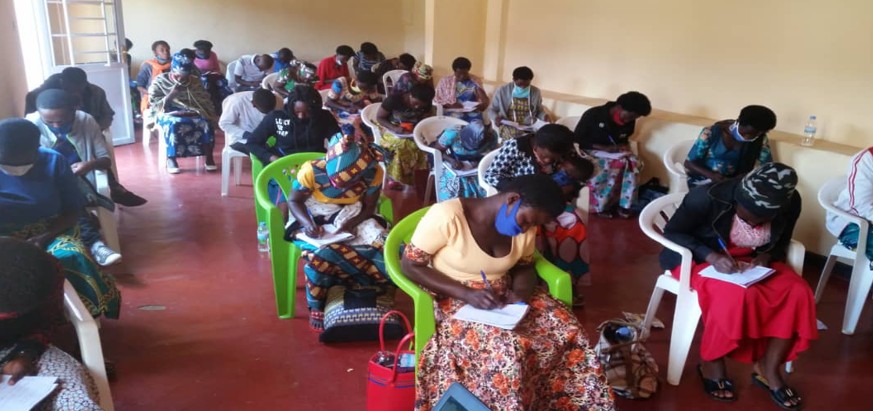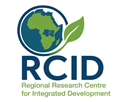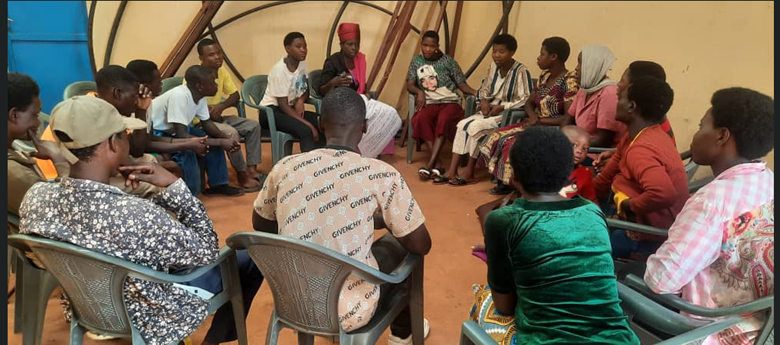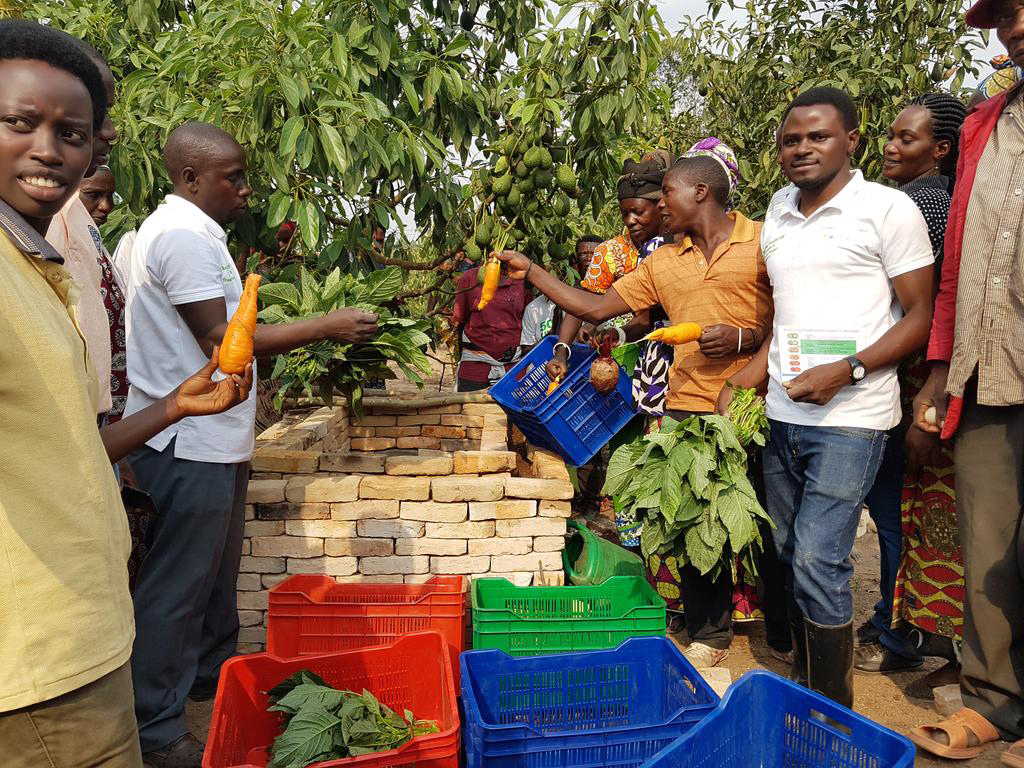Agriculture Service Details
RCID's Impact in Rwanda's Agriculture Sector
RCID Agriculture Projects & Initiatives
Snapshots of our work and impact in Rwanda's agriculture sector
1,290
Cooperative members surveyed
108
Cooperatives assessed
39
Key Informant Interviews
971
FGD participants
Assessing the Needs of Cooperatives in Coffee, Tea, and Horticulture Value Chains in Rwanda
The Regional Research Centre for Integrated Development (RCID) conducted a national assessment of the capacity development needs of cooperatives in Rwanda's coffee, tea, and horticulture value chains in 2024 under the Promoting Smallholder Agro-exports Competitiveness (PSAC) Project. Implemented by Cordaid and NAEB with support from IFAD, the study aimed to identify key capacity gaps and develop a targeted, inclusive, and practical capacity development plan to strengthen the institutional, financial, and operational performance of cooperatives.
The study employed a mixed-methods approach, integrating both quantitative and qualitative techniques to assess financial service gaps and institutional dynamics. A total of 1,290 cooperative members from 108 cooperatives across key production districts participated in a structured survey, exceeding the targeted sample. This robust dataset offered valuable insights into access to finance, value chain engagement, and service delivery challenges.
To complement these findings, RCID conducted 39 Key Informant Interviews (KIIs) with stakeholders from government agencies, financial institutions, NGOs, and the private sector, along with 108 Focus Group Discussions (FGDs) involving 971 cooperative members, including women, youth, widows, and persons with disabilities (PWDs).
Fieldwork was conducted in close collaboration with CORDAID, NAEB, and local partners. The assessment examined five priority areas: entrepreneurship and cooperative leadership, financial literacy, digital integration, market access, and farming as a business. It also evaluated the adoption of climate-smart agriculture practices and analyzed the readiness of financial institutions to support cooperatives.
Special attention was given to inclusion and social equity, ensuring that the perspectives and needs of women, youth, and persons with disabilities (PWDs) were captured and reflected in the proposed recommendations. RCID designed a practical capacity development plan based on existing Cordaid training modules, tailored to the unique needs of value chain actors.
Based on the findings, RCID developed a tailored capacity-building roadmap aligned with Cordaid's training modules, supported by a business model and financial analysis. The resulting recommendations provide a foundation for inclusive, market-driven, and climate-resilient cooperative development across Rwanda.
Develop a Business model of Agriculture Value Chain and Market Systems Strengthening in Rwanda
Collaboration with CARE International Rwanda and DUHAMIC ADRI under the PROFIFA Project (Promote Financial Inclusion for Smallholder Farmers), funded by Access to Finance Rwanda (AFR). Implemented from November 2019 to August 2020, the project addressed systemic market failures that limited women smallholder farmers' access to financial services, market opportunities, and productive resources in six districts of Rwanda.
In this context, RCID was contracted to develop an Inclusive Agriculture Value Chain Market-Driven Business Model focusing on maize and horticulture value chains in Rwamagana, Gakenke, and Huye Districts. RCID conducted a rapid assessment of existing value chain structures and identified service providers across the pilot areas. The assessment included mapping of key actors, their roles, relationships, and gaps in support services along the supply chains.
The model developed by RCID emphasized strengthening business relationships between farmer groups and other value chain stakeholders through the establishment and enhancement of Agribusiness Forums. RCID also delivered Business Development Services (BDS) and coaching to improve technical, managerial, and negotiation skills of smallholder farmers. These interventions aimed to boost productivity, support formal financial inclusion, and increase access to markets by enhancing trust and coordination between farmers and off-takers. RCID's work in this project illustrates its commitment to empowering rural farmers and advancing inclusive agricultural market systems in Rwanda.
Strengthening the Agri-business Initiative Portfolio of the Development Bank of Rwanda (BRD)
The Regional Research Centre for Integrated Development (RCID) is delivering strategic technical assistance to the Development Bank of Rwanda (BRD) under the Agri-business Initiative Portfolio from 2024 to 2027. This initiative is designed to strengthen Rwanda's agricultural SME ecosystem by addressing persistent financing gaps, particularly for youth- and women-led agribusinesses. The program aligns with Rwanda's broader goals of agricultural transformation and commercialization, contributing to national priorities such as job creation, food security, rural development, and poverty reduction. It complements major national initiatives, including the World Bank's US$300 million program launched in 2022 to boost irrigation, productivity, and market access.
Under this assignment, RCID will support BRD and its partners to enhance the institutional and financial readiness of agribusinesses through a variety of services. RCID will conduct feasibility assessments, project appraisals, and market studies to evaluate and inform investment opportunities across agricultural value chains. These assessments guide the design of tailored financing instruments suited to the operational realities of SMEs. RCID also works to strengthen the link between agribusinesses and financial institutions by helping SMEs build sound business plans and data-driven investment cases that attract funding.
Capacity building is a key pillar of this technical assistance and RCID facilitates training sessions and mentorship programs for both BRD staff and agri-entrepreneurs. These cover business planning, financial literacy, and investment readiness, thereby improving the quality of projects submitted for financing and enabling sustainable growth of SMEs. The program ultimately aims to improve the bankability of agricultural enterprises, enhance access to finance, and increase resilience in the agri-business sector.
Commercial-led Business Development Services (Sector-Specific Support Agriculture) to SMEs through the Terimbere SME Financing Readiness Village
Through the Terimbere SME Financing Readiness Village initiative, commissioned by Access to Finance Rwanda (AFR), the Regional Research Centre for Integrated Development (RCID) has provided targeted technical assistance to agricultural SMEs across all 30 districts of Rwanda, with a strong focus on youth- and women-led enterprises. Building on this foundation, RCID will deepen its impact from 2024 to 2027 through one-on-one mentorship, strengthened linkages with financial institutions and markets, and a Training of Trainers (ToT) model that equips young graduates to serve as local business development service providers. The program improves SMEs’ financial and investment readiness while advancing inclusive economic growth and sustainable agriculture. In parallel, RCID delivers tailored diagnostic, governance, and business support to cooperatives such as Icyerekezo Misizi in Gisagara District and KOTEMUIGA in the Irish potato value chain, and provides ongoing technical assistance (from August 2025 to date) to 15 SMEs in the rabbit and poultry value chains. Key interventions focus on strengthening governance, financial management, regulatory compliance, technology adoption, and market linkages, transforming cooperatives from subsistence activities into sustainable and profitable agribusinesses.
Production and distribution of training materials for agriculture frontline extensions agents in Rwanda
The Ministry of Agriculture and Animal Resources (MINAGRI) of Rwanda prioritizes food security and nutritional diversity as key development objectives. Since July 2012, the Rwanda Agriculture Board (RAB), through its Crop Production and Food Security Department, partnered with One Acre Fund (OAF) to implement the "Twigire Muhinzi" agricultural extension model. This model aims to strengthen the agricultural extension system by efficiently transferring appropriate farming practices and technologies to small-scale and subsistence farmers, addressing critical challenges in productivity and food security.
From 2016 to 2018, RCID Ltd was contracted by One Acre Fund to support this initiative by producing and distributing agricultural training materials and inputs to frontline extension agents across Rwanda. These agents include district and sector agronomists, cell social economic development officers, farmer promoters, and Farmer Field School facilitators. The materials provided were designed to enhance knowledge transfer and improve the capacity of extension workers to effectively engage with farmers.
RCID's role ensured that extension agents were well-equipped with up-to-date, context-relevant resources to promote sustainable farming techniques. This effort contributed significantly to increasing agricultural productivity and improving the livelihoods of smallholder farmers. By supporting the dissemination of critical training tools, RCID played a key part in advancing Rwanda's agricultural development goals and strengthening the link between research, extension services, and farming communities.
Bean Enterprises and Structured Trade in EAC (BEST EAC) program in Rwanda
Beans are one of the primary contributors to nutrition security in the East African Community (EAC), serving as a staple food for approximately 41% of the population. In response to this critical role, UKAid, through the Food Trade Eastern and Southern Africa (ESA) program and in partnership with Kilimo Trust, launched the "Bean Enterprises and Structured Trade in the East African Community (BEST EAC)" program, implemented from 2015 to 2018. The overarching goal of the program was to support consumer-driven markets and promote structured regional trade in beans and bean-based products across the EAC. By doing so, the program aimed to enhance food and nutrition security, foster wealth creation, and contribute to sustainable agricultural development.
RCID Ltd was contracted by Kilimo Trust to implement key components of the program in Rwanda, specifically targeting 2,000 smallholder farmers organized under cooperative trading consortia in the Eastern and Northern provinces. The assignment aimed to improve production capacities, household incomes, food security, and overall livelihoods.
RCID's core responsibilities included conducting Training of Trainers (ToT) programs for four farmer cooperatives. The training covered essential areas such as business development, entrepreneurship, market access, cooperative governance, financial literacy, gender equality, post-harvest handling and storage (PHHS), pest and disease control, and Good Agronomic Practices (GAP). Additionally, RCID implemented demonstration research using the Farmer Field School (FFS) model to support hands-on learning and adoption of improved techniques. Regular performance reviews were also conducted to assess progress, document lessons learned, and ensure that project activities remained aligned with the program's intended outcomes.
Improving Market Systems for Agriculture in Rwanda (IMSAR) Evaluation Service Provider (ESP)
The Regional Research Centre for Integrated Development (RCID Ltd) served as the Evaluation Service Provider (ESP) for the "Improving Market Systems for Agriculture in Rwanda (IMSAR)" program, a four-year initiative funded by the UK Government through the Department for International Development (DFID) and implemented by Palladium International. With a total investment of GBP £23.5 million, IMSAR sought to improve the incomes of poor rural households by strengthening agricultural market systems through private sector engagement, innovation, and inclusive growth. Known locally as "Noza Isoko," the program aimed to address inefficiencies in market systems that hinder smallholder farmers and agri-businesses from fully participating in and benefitting from agricultural opportunities.
Under subcontract with NIRAS–LTS International, RCID provided comprehensive performance evaluations across IMSAR's four core portfolios: inputs, finance, aggregation, and export markets. The assignment included assessing the outcomes of technical assistance and grant-based interventions targeting farmers, MSMEs, cooperatives, and public sector stakeholders. RCID measured program effectiveness in terms of market access, enterprise growth, and inclusion of vulnerable groups, with specific attention to cross-cutting themes such as nutrition, gender equity, and climate change resilience. RCID's work also involved evaluating partnerships between Rwandan exporters and retail suppliers. This included assessing production capacities, quality standards, product varieties, workforce size, and readiness to meet international market requirements. Regular reporting and impact-oriented analysis supported adaptive learning, enabling IMSAR and its partners to fine-tune interventions in real time.
Through this assignment, RCID played a key role in shaping evidence-based strategies to enhance agricultural competitiveness, drive inclusive rural development, and create sustainable economic opportunities within Rwanda's evolving agri-market landscape. The work exemplifies RCID's commitment to results-based monitoring, evaluation, and learning in complex agricultural development programs.
Final Evaluation of the Agricultural and Land Policy Engagement Program in Rwanda
From February to April 2022, the Regional Research Centre for Integrated Development (RCID) conducted the final evaluation of ACORD Rwanda's program on agricultural and land policy analysis, implemented between 2017 and 2021. The evaluation aimed to assess the effectiveness of ACORD Rwanda's strategies in engaging smallholder farmers in monitoring and influencing the implementation of land and agricultural policies across the country.
The evaluation examined the program's overall performance, with particular focus on how it strengthened citizen engagement and advocacy efforts around land tenure, social protection, and agricultural policy reforms. RCID analyzed the extent to which the program enabled smallholder farmers to participate meaningfully in shaping policy processes affecting their livelihoods.
The assessment also highlighted key achievements, innovative approaches, and gaps in program delivery. It provided actionable recommendations on how ACORD Rwanda and its partners can enhance long-term support for smallholder farmers amid growing challenges such as land degradation, climate change, ecosystem fragility, and food system vulnerabilities.
This evaluation has informed strategic planning for future programming and reinforced the importance of inclusive, farmer-centered policy engagement for building resilient and equitable rural development systems in Rwanda.
Baseline, Follow up and Mid line studies for impact assessment of Uzima Chicken Ltd in Rwanda
The Regional Research Centre for Integrated Development (RCID Ltd) was contracted by UK LTS International and the NIRAS Consulting Group to conduct baseline, follow-up, and midline studies to assess the development impact of Uzima Chicken Ltd's operations in Rwanda. These studies were commissioned as part of a broader impact evaluation supported by AgDevCo, which provided a $3 million debt investment to Uzima Chicken Ltd under funding from the UK Department for International Development (DFID).
Uzima Chicken Ltd is an East African poultry company specializing in the production and distribution of the SASSO breed a dual-purpose chicken known for its productivity and adaptability to smallholder, backyard environments. The company's model involves distributing Day Old Chicks (DOCs) through an extensive network of sales agents, reaching smallholder farmers across the region.
RCID's role focused on assessing the social and economic impacts of Uzima's business model on rural households. This included establishing a poverty baseline using CPDA (Client Protection Diagnostic Assessment) metrics, tracking asset values, and measuring income changes among smallholder farmers and sales agents over time. The studies also evaluated the effectiveness of the CPDA approach and provided insights into Uzima's business performance.
The findings generated by RCID supported learning and evidence-based decision-making for both Uzima Chicken Ltd and AgDevCo. The results informed improvements to the poultry value chain and helped ensure that the investment translated into meaningful development outcomes, including enhanced livelihoods and food security for smallholder farmers in Rwanda.
Feasibility Study on Value Addition and Processing of Chili and Pineapple in Eastern Rwanda
RCID conducted a comprehensive feasibility study on value addition and processing opportunities for chili and pineapple, commissioned by African Evangelic Enterprises (AEE) and funded by the European Union in 2022. The study focused on Gasabo, Bugesera, Rwamagana, and Kayonza districts, which form a significant hub for horticultural production under the EU Horticulture Project.
The project aimed to identify viable technologies and market opportunities for transforming raw produce into higher-value products, supporting income generation and competitiveness among smallholder farmers and agri-entrepreneurs. RCID's multidisciplinary team carried out extensive fieldwork, engaging local producers, cooperatives, traders, and buyers to gather insights on production trends, post-harvest losses, and the demand for processed products such as dried chili, chili paste, and pineapple juice.
Through technical and economic analysis, the study assessed the scalability of various value addition technologies suited to local conditions. Recommendations were made for the adoption of context-appropriate processing equipment, enterprise development strategies, and aggregation models. Special attention was given to gender inclusion and youth engagement, ensuring the proposed solutions promote equitable participation in the chili and pineapple value chains.
This assignment reinforced RCID's commitment to supporting Rwanda's agribusiness transformation through market-led, inclusive, and climate-smart interventions that enhance local value creation and rural livelihood.

"RCID's work has transformed the way cooperatives and smallholder farmers engage with markets and financial institutions in Rwanda. Their evidence-based approach and commitment to inclusion are making a real difference."
Agriculture in Action: RCID Project Gallery
Snapshots from RCID's work in Rwanda's agriculture sector

Technical Assistance for Community Empowerment and Climate-Resilient Livelihoods in Rwanda
RCID Support to FVA Beneficiaries (2020–2022)
From March 2020 to September 2022, the Regional Research Centre for Integrated Development (RCID Ltd) provided technical assistance to Faith Victory Association (FVA) beneficiaries through a series of projects funded by various development partners. The work delivered by RCID contributed to strengthening community resilience in the areas of gender equality, socio-economic empowerment, entrepreneurship, financial inclusion, climate change adaptation, and rights awareness.
In partnership with World Vision Rwanda and FVA under the Creating Off-farm Rwandan Enterprises (CORE) project, RCID supported farmers' cooperatives in Nyamasheke and Rusizi districts by building their capacity in VSLAs, financial management, leadership, and entrepreneurship. The training enhanced women and youth engagement in tailoring and honey value chains, boosting off-farm income, competitiveness, and the economic resilience of targeted communities.
Under ActionAid Rwanda's SPEAK OUT and POWER projects, RCID worked with women and men in rural communities to raise awareness about gender inequalities, education rights, and gender-based violence (GBV) in Gisagara, Nyanza, Nyaruguru and Karongi districts in Rwanda. These trainings also addressed systemic barriers to women's political participation, promoting inclusive governance and empowerment.
Additionally, under the project "Implementation of the Livelihood Restoration Plan (LRP)" linked to the Rwanda-Burundi 220 kV Interconnection Project (BRIP), funded by the Energy Development Corporation Limited (EDCL), RCID supported communities affected by infrastructure expansion. The team developed and translated technical modules on improved cooking stove technologies, climate-resilient agriculture, small livestock and fish farming, post-harvest handling, and sustainable kitchen gardening. These efforts were crucial in promoting livelihood recovery, climate adaptation, and food security for displaced and vulnerable households.
RCID's contribution reinforced FVA's mission by delivering transformative community-based interventions that uphold gender rights, support inclusive economic development, and strengthen climate-smart rural livelihoods.










